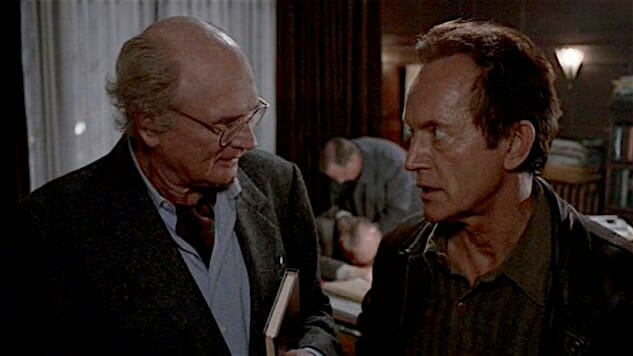Revisiting The X-Files and Writer Darin Morgan’s Compassionate Misanthropy in Millennium

On Monday, February 1, X-Files fans will get to see something they haven’t seen in almost 20 years: a new episode written by Darin Morgan. Yes, the mad genius behind fan favorites “Humbug,” “Clyde Bruckman’s Final Repose” (this writer’s pick for the series’ finest episode), “War of the Coprophages” and “Jose Chung’s From Outer Space” has a new contribution to X-Files lore in the form of the third episode of this new mini-season, “Mulder and Scully Meet the Were-Monster.” Having seen the episode in advance, I can assure you all that it is wholly up to Morgan’s previous high standards, a riot of uproarious gags and fiendishly clever one-liners, all in the service of a sensibility that miraculously manages to locate pathos even in misanthropy.
But while it’s been almost 20 years since Morgan contributed a script for The X-Files, he has been writing in the meantime—not a whole lot, mind you (according to IMDb, he wrote no scripts between 1998 and 2010), but he does have a handful of non-X-Files-based writing credits to his name. Two of them are for another show from X-Files creator Chris Carter: his 1996-1999 series Millennium, for which Morgan contributed two episodes during its second season. Those two episodes—“Jose Chung’s Doomsday Defense” and “Somehow, Satan Got Behind Me” still deserve our attention, all these years later.
If The X-Files generally focused on the supernatural, Millennium dealt with horrors that were all-too-human in nature: murderers, serial killers, psychos, and the like. It was a much grimmer affair overall. And its darkness was exemplified by its star, Lance Henriksen—all craggy dourness as Frank Black, a forensic profiler with an especially acute, possibly partly psychic, ability to see into the minds of criminals. In some ways, Millennium hasn’t aged quite as well as The X-Files, especially since the impending-new-millenium-based anxieties that partly fueled the show have long passed into historical oblivion. Nevertheless, in its focus on a character’s ultimately failed quest to shield his family from the evils of the outside world, Millennium is arguably an even more effective exploration of Carter’s pet themes—and with the later show lasting only three seasons, it was never allowed to wear out its welcome the way many believe The X-Files did.
Darin Morgan’s two episodes came during Millennium’s second season (in which executive producers Glen Morgan and James Wong—both X-Files alumni whom Carter put in charge of the season while he was busy working on the first X-Files feature film) turned the Millennium Group—the investigative consulting firm to which Frank Black belonged—into a more shadowy religious sect trying to battle the growing evils of the world in the run-up to the year 2000. With its development of its own arcane mythology, this second season was the most X-Files-like of Millennium’s three seasons—which perhaps explains why Darin Morgan was allowed to bring his wild, black-comic sensibility to the show’s otherwise gloomy hallways.
These two episodes also represented Morgan’s first two attempts at directing his own material (his upcoming X-Files episode is his third). This is significant because it may explain why “Jose Chung’s Doomsday Defense” and “Somehow, Satan Got Behind Me” feel like sharper articulations of his worldview than even his celebrated X-Files episodes.
“Jose Chung’s Doomsday Defense” brings back novelist Jose Chung (Charles Nelson Reilly) from The X-Files’s “Jose Chung’s From Outer Space”—but while he’s working on a new novel, his role here is more than just that of a bemused, detached observer. Morgan dives more deeply into Chung’s blinkered view of the world, his cynicism standing in stark contrast to the relentless optimism posited by Selfosophy, the Scientology-like cult both he and Frank Black investigate in the episode. When he discovers his life is in danger as a result of a story he’s recently published condemning Selfosophy, Chung ramps up the world-weary musings. “Life is downbeat,” he says to Frank at one point; in what turns out to be his last book, he offers his own prophesy of what will come in the new millennium: “1,000 more years of the same old crap.”
-

-

-

-

-

-

-

-

-

-

-

-

-

-

-

-

-

-

-

-

-

-

-

-

-

-

-

-

-

-

-

-

-

-

-

-

-

-

-

-









































